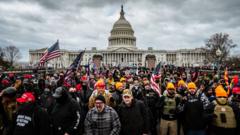Kamala Harris has continually navigated the political landscape with her prosecutorial background under scrutiny, as she redefines her narrative amidst an evolving political environment.
From Prosecutor to Presidential Candidate: The Evolution of Kamala Harris

From Prosecutor to Presidential Candidate: The Evolution of Kamala Harris
A deep dive into the complexities of Vice President Kamala Harris's journey from courtroom to campaign trail.
In a transformative moment just three months ago, Vice President Kamala Harris launched a pivotal campaign speech that would shape both her past and future. Following President Joe Biden's withdrawal from the race, he endorsed Harris as his successor for the Democratic candidacy. With limited time for campaigning, the stakes were high. "Define yourself or be defined by your opponent," is a well-known adage in politics, and Harris seized this opportunity to establish her identity not solely as a sitting vice president or former senator but through her earlier career as a California prosecutor.
“I took on perpetrators of all kinds - predators who abused women, fraudsters who ripped off consumers, cheaters who broke the rules for their own gain. So, hear me when I say: I know Donald Trump's type,” Harris stated during her speech, effectively illustrating a contrast between herself and her Republican opponent, who faces numerous legal challenges. This statement has since echoed through her campaign rallies and speeches as she attempts to solidify her position in the race and portray herself as a candidate shaped by tough prosecutorial experience.
Investigating Harris's lengthy career, particularly her time in California's courtrooms, sheds light on her struggles for self-definition, criticisms regarding her adaptability to political tides, and an uncanny resilience to thrive when many have deemed her future uncertain. Adapting to the intense climate of the 1990s "war on drugs," Harris began her career in Alameda County, California—an experience marked by exposure to severe violent crimes amid rampant gang activities. Colleagues remember a young Harris with a strong resolve navigating these demanding cases and reflecting compassion toward victims, particularly children.
As her political career began to flourish, she became entwined with notable figures in California politics, including her brief relationship with Willie Brown, a significant political influencer. The romance ended around the time he became mayor, but it propelled her into a broader political circle, facilitating her rise alongside other Democratic stalwarts like Gavin Newsom and Nancy Pelosi.
In her early days as the district attorney for San Francisco, Harris faced scrutiny when she opted against the death penalty for the gang member who killed police officer Isaac Espinoza—a decision she defended despite backlash from political titans who had previously endorsed her. Critics noted her choice, which some viewed as naive, was rooted in her firm stance against capital punishment; a principle she continued to uphold, despite encountering immense pressure.
Harris's prosecutorial decisions, including high-stakes negotiations post-financial crisis, solidified her image of a pragmatist navigating the fine line of being tough on crime while supporting reform—an identity that has met scrutiny from both sides of the political aisle. Throughout her tenure, the blending of progressive prosecutorial policies, such as initiatives for youth offenders, met varying responses as she transitioned to the attorney general role.
However, the complexities of her position continued to surface as she later deflected criticisms over her evolving stance on the death penalty and immigration policies, particularly as her presidential campaign evolved. In the shifting landscape of public opinion on issues like law enforcement after George Floyd's tragic death, Harris is faced with the intricate task of redefining her past as a prosecutor in a manner that resonates with current voters.
Now, with the spotlight on her once again, Harris presents herself as a seasoned prosecutor in the context of the 2024 elections, framing her narrative against the backdrop of Trump's legal controversies. Striking a balance in her evolving political narrative, she prepares to contend with accusations of opportunism while seeking to capture the moderate Republican vote.
Throughout her career, Harris has confronted the query of what she genuinely stands for—a question that persists as she approaches another critical juncture in her political journey. Yet those who have worked alongside her know her tenacity and intellect prevail over the doubts cast against her aspirations. Harris has consistently charted her own course while navigating the often challenging waters of American politics, leaving behind a trail of skepticism now turned into political might.





















